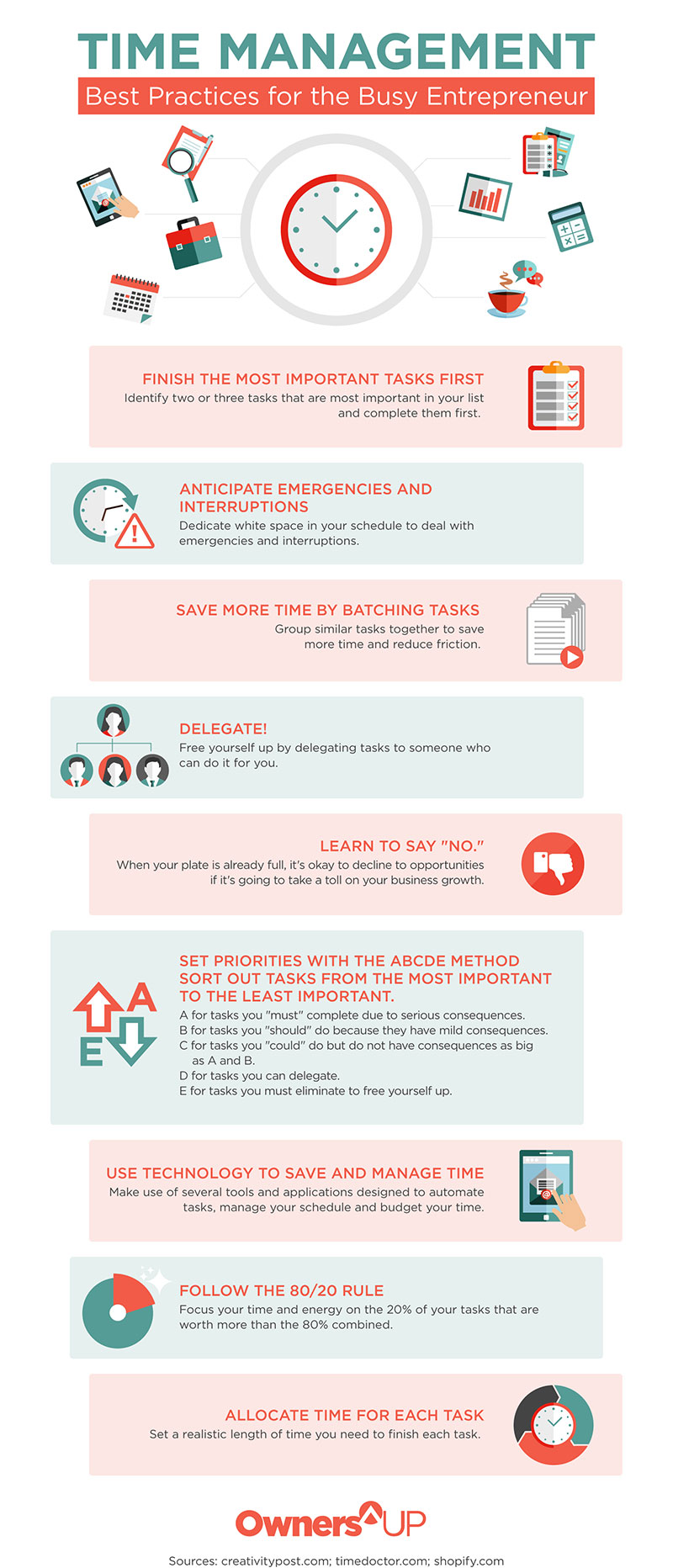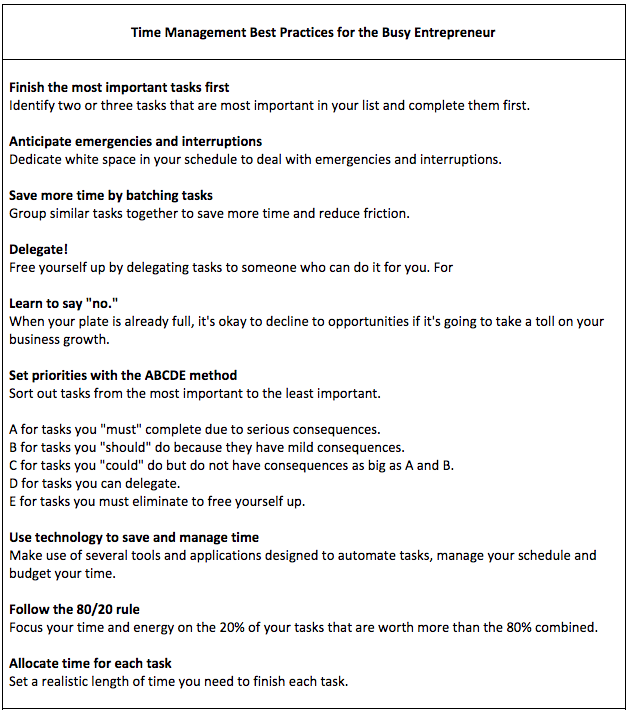Time Management Best Practices for the Busy Entrepreneur
Sep 10, by Tanya Alvarez

It’s common to feel that 24 hours aren’t enough to juggle work, leisure, and me-time in one day. If you are a busy entrepreneur, you’re probably tired of getting bombarded with tasks. No matter how much work you finish, it feels like it doesn’t end. Most often than not, you’ll sacrifice sleep to give more time for your tasks.
While part of being productive is working hard and working more, you can’t be stuck in the same cycle forever. Otherwise, it will do you and your business more harm than good.
Time is, indeed, the most important resource that we have. It’s limited, and it expires every minute. This stresses the need to make every second count because when time is gone, it is gone forever and there’s no turning it back.
Learning how to manage your time is part of being a smart entrepreneur. Given the number of tasks that you need to juggle such as meeting clients, joining an online mastermind group for entrepreneurs, and improving your business operations, time management is essential.
Learn how to work smart by managing your time effectively. Here’s an infographic that shows some proven time management best practices adopted by busy entrepreneurs like you.
Finish the most important tasks first
Every day, identify two or three tasks that are most important in your list. It could be the hardest tasks or the one with the strictest deadline.
Be sure to complete these tasks first before the others. Once you’re done with them, the rest of your day will become light and easy because you have already achieved something. You even have the option to move non-urgent tasks to the next day.
Anticipate emergencies and interruptions
When you pack your day with activities without leaving a space for contingencies, it’s easy to be shaken up when something unexpected arises. Emergencies and interruptions are inevitable, and as a smart entrepreneur, you should be ready for it.
Dedicate white space in your schedule so that you don’t have to stress yourself to adjusting your time to accommodate interruptions.
Save more time by batching tasks
Shifting tasks alone consumes time, especially when you need to set up tools and open various applications. Imagine how much time is wasted when you change from one task to another and then go back to the same task after. By grouping similar tasks together, you do not only save more time but also reduce friction caused by constantly changing tasks.
Delegate!
Admit it. You only have two hands and limited time. Free yourself up by delegating tasks to someone who can do it for you. For a task that takes an hour to finish, you can spend 10 minutes to explain it to someone. That saves you 50 minutes! If it’s a repetitive task, it will save you even more time.
Learn to say “no.”
It’s hard to decline opportunities especially when they will benefit your company. But while “work, work, work” is your mantra, there is a big difference between being productive and taking it too far. Handling multiple tasks is great, but too much work can be damaging to your business growth.
So when your plate is already full, it’s okay to say “no” to commitments if it’s going to take a toll on your progress. If it’s really not easy to decline, you can say “later.”
Set priorities with the ABCDE method
Prioritizing tasks is as easy as your ABC. In this method, you are simply putting tasks in order of priority.
A. for tasks you “must” complete due to serious consequences when left unfinished.
B. for tasks you “should” do because they have mild consequences when not completed.
C. for tasks you “could” do but do not have consequences as big as A and B.
D. for tasks you can “delegate” to others.
E. for tasks you must “eliminate” if possible to free yourself up.
The ABCDE method allows you to sort out tasks from the most important to the least important.
Use technology to save and manage time
You don’t have to be a tech-savvy to benefit from several applications and tools available today which are designed to help you speed up your processes and manage your schedule.
For instance, you can use time tracking apps to monitor the length of time you spend for each task. You can join business networking groups or a mastermind group for entrepreneurs online so you can brainstorm and get insights without the need to travel. There are automation tools that can eliminate manual processes for you such as emails, social media posts, and bill payments. Use your mobile calendars to set up meeting reminders and other tasks.
Nowadays, there are tools and applications for almost anything that you do. Use these to your advantage to budget and save your time well.
Follow the 80/20 rule
Not all tasks bring the same results and have equal value so it’s important that you focus your time and energy on those that are more important. Out of 10 tasks, for instance, two of them are worth more than all the other 8 tasks combined. Therefore, these tasks must be accomplished first.
By following the 80/20 rule, you make sure that the 20% of your tasks that are more worth it should be on top of your priorities. You only start working on the other 80% unless they are done.
Allocate time for each task
It’s not enough to just list down your tasks for a day and then work on them. Part of this should be setting a length of time to finish each task. When you do, be sure to make it realistic so you wouldn’t end up squeezing your to-do list in a busy routine.

For more information on time management, see this post.